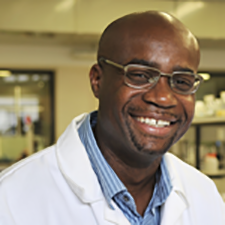From phenotypic whole cell screening to target-based drug discovery in Malaria and Tuberculosis, by Kelly Chibale, Professor, South African Research Chair in Drug Discovery, University of Cape Town

The Department of Chemistry Presents, via Webinar: From phenotypic whole cell screening to target-based drug discovery in Malaria and Tuberculosis, by Kelly Chibale, Professor, South African Research Chair in Drug Discovery, University of Cape Town
Within the context of malaria and tuberculosis drug discovery, phenotypic whole cell screening can uncover cell permeable and active drugs leads with potentially novel modes of action. From our in-house drug discovery programs underpinned by medicinal chemistry, several series of antiplasmodial and antimycobacterial actives were identified from phenotypic whole cell screening efforts. Hit molecules demonstrating good in vitro antiplasmodial and antimycobacterial activity against the respective causative agents, Plasmodium falciparum and Mycobacterium tuberculosis, with low cytotoxicity were prioritized for cell-based medicinal chemistry optimization to identify leads and preclinical drug development candidates. Mechanism of action (MoA) studies through target identification were also undertaken for the respective chemical series.
This talk will describe the drug discovery process that led to the identification of drug leads. Target identification aspects will also be presented.
Biography:
Kelly Chibale is a full Professor of Organic Chemistry at the University of Cape Town (UCT) where he holds the Neville Isdell Chair in African-centric Drug Discovery & Development. He is also a Full Member of the UCT Institute of Infectious Disease & Molecular Medicine, a Tier 1 South Africa Research Chair in Drug Discovery, founding Director of the South African Medical Research Council (SAMRC) Drug Discovery & Development Research Unit at UCT and the Founder and Director of the UCT Drug Discovery and Development Centre (H3D).
Kelly obtained his PhD in Synthetic Organic Chemistry from the University of Cambridge in the UK (1989-1992). This was followed by postdoctoral stints at the University of Liverpool in the UK (1992-94) and at the Scripps Research Institute in the USA (1994-96). He was a Sandler Sabbatical Fellow at the University of California San Francisco (2002), a US Fulbright Senior Research Scholar at the University of Pennsylvania School of Medicine (2008) and a Visiting Professor at Pfizer in the UK (2008).
Research Interests
Our current medicinal chemistry programme against the causative agents of malaria, tuberculosis and helminth infections on one hand, and cardiovascular disease on the other, has four main objectives:
To develop target–directed inhibitors.
Progress hits from target– and phenotypic whole cell–based high throughput screening campaigns to deliver leads suitable for optimization and ultimately candidate selection.
To generate diversity in complex natural products through semi-synthesis and use of biotransformation.
To employ biotransformation in the generation and characterization of pharmacologically active and potentially toxic reactive metabolites of drugs and drug leads.
To repurpose/reposition and rescue clinical compounds.
Kelly Chibale’s earlier work has included asymmetric synthesis utilizing sulfur and organolanthanide chemistry as well as the total synthesis of natural and designed biologically relevant molecules.
E-mail: Kelly [dot] Chibale![]() uct [dot] ac [dot] za.
uct [dot] ac [dot] za.
https://gwu.webex.com/gwu/j.php?MTID=m89af7be91f93526f0825fc0090210d62

